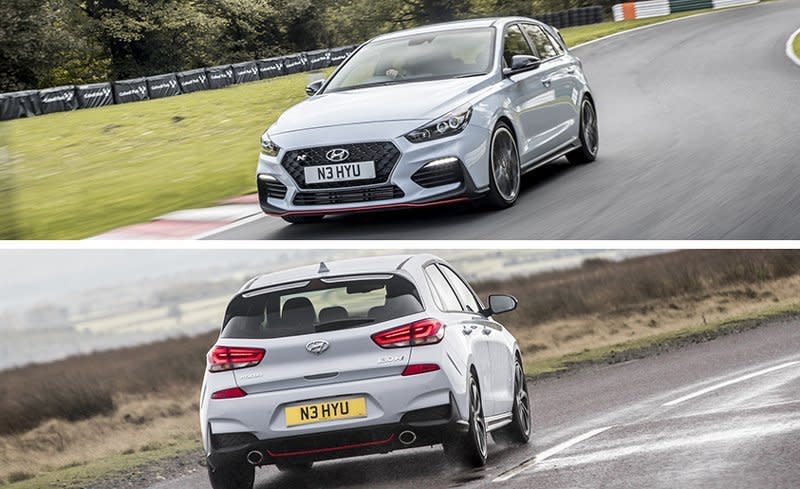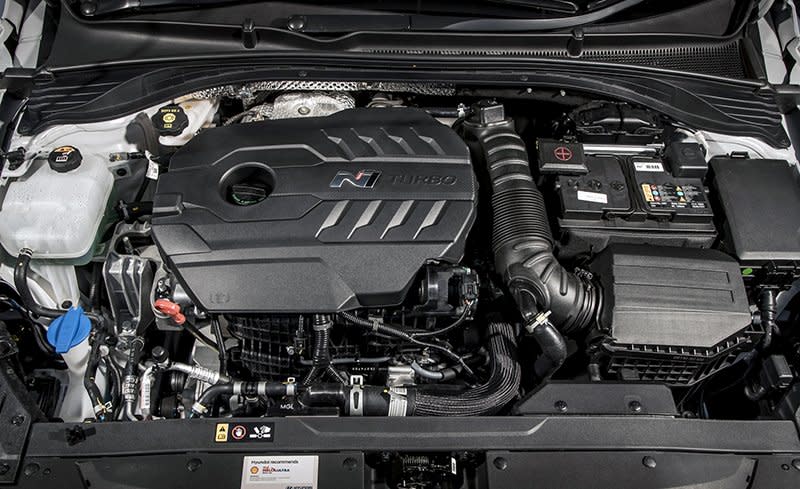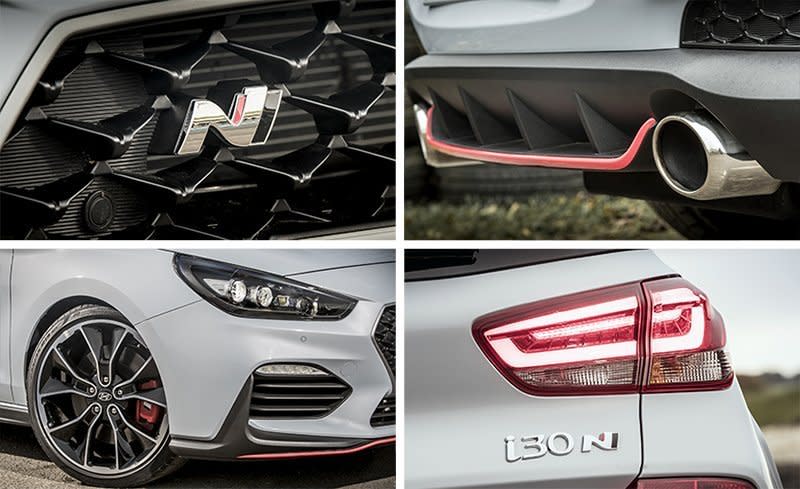2018 Hyundai i30 N

We can’t tell you what the new Hyundai Veloster N is like to drive yet, but we have sampled its more symmetrical four-door sibling, the Europe-market i30 N. It is both the first product from Hyundai’s N performance division and a preview of the mechanical package that buyers in the United States will experience in the hotter, three-door Veloster.
The Great Configurator
The omens are good for anyone waiting for an old-fashioned performance hatchback, one that doesn’t leaven its excitement with an excess of character-sapping refinement. Although its thrills are amusingly basic, the i30 N also offers an almost unprecedented level of user adjustability. On its steering wheel are two mode-selection buttons. The left one gives access to Normal, Sport, and Eco modes—the last of which we doubt that owners of a 271-hp hot hatch will select often. The button on the right wears an N logo and can dial up both an ultra-aggressive, track-focused N mode and a driver-tweakable N Custom setting.

The latter allows the central touchscreen to be used to select different levels of aggression for most of the car’s dynamic systems. There’s engine mapping (Normal, Sport, Sport+), rev-matching throttle-blipping (off, Normal, Sport, Sport+), adjustable dampers (Normal, Sport, Sport+), steering weight (Normal, Sport, Sport+), and stability control (Normal, Sport, off). The slightly more powerful Performance package–equipped version we drove also presented adjustments for its electronically controlled limited-slip differential (Normal, Sport) and adjustable exhaust (Normal, Sport, Sport+). According to our venerable Texas Instruments TI-85, that’s a grand total of 1944 possible dynamic configurations, if you count “off” as a setting. Many race cars are less adjustable.
Lovable Thug
While the search for the perfect combination may well be never-ending, that need not diminish the enjoyment of a rapid, unpretentious performance hatch. The European i30 hatch is effectively our Elantra GT, and much of the i30 N’s hardware is the same as the upcoming Veloster N. Both cars share a turbocharged version of the company’s 2.0-liter inline-four, a member of the Theta engine family; two power outputs are available, both splitting the difference between the Volkswagen GTI and Golf R. The standard i30 N has 247 horsepower while the i30 N Performance version has 271, the brawnier model also gaining 19-inch wheels instead of the standard 18s, fractionally bigger brakes, and the aforementioned electronically controlled limited-slip differential and active variable exhaust system. The only transmission choice for now is a six-speed manual and, as with the Honda Civic Type R, performance is delivered through the front wheels only.
The engine has a thuggish quality that suits the car well. Boost arrives late and hard, its low-rev anemia turning to a full-blooded surge with a pulse-spiking suddenness. Hyundai claims the same peak torque output of 279 lb-ft at 1750 rpm for both the regular and Performance models, by way of an overboost function for up to 18 seconds at a time. Short of trying to climb a steep hill in a low gear, it would be hard to encounter that limit. The soundtrack is deep-throated even with the exhaust in its quieter mode, and approaches anti-social when revved with the exhaust in its louder setting. The engine spins freely to its 6000-rpm horsepower peak and continues slightly less willingly to the rev limit 750 rpm later. Sequential upshift LEDs are integrated into the top of the instrument cluster to encourage harder applications of stick.

While the limited-slip differential helps the i30 N find impressive traction, there is still some torque steer at low revs. But it’s of the exciting rather than wayward variety. The engine does feel as if it’s spinning a hefty flywheel, and it holds onto its revs like a miser when the throttle is lifted, so downshifts need to be timed carefully. In top gear the engine is turning at just 2100 rpm at 60 mph, a scenario where throttle inputs are met with much lag. Thankfully, downshifting is a joy, as the shift action is accurate and nicely weighted.
Ride quality is firm even with the dampers in their more pliant settings, and higher speeds over anything other than perfect surfaces produce lots of road noise to add to the engine’s always-present grumble. The audio system also suffers from a tinny tone and struggles to make itself heard during even moderately enthusiastic driving. At higher speeds and cornering loads, the chassis proves itself to be well disciplined, resisting roll and fighting hard to prevent bumps from throwing the car off a chosen line. The steering is excellent, although—as is often the case with electrical assistance—it feels most natural in its mellowest setting. The N mode is too harsh for street use, but myriad customization options means it should be possible to find a sweet spot for both conditions and driver preference.

It’s Honest
While the i30 N isn’t one of the quickest cars in its increasingly powerful segment, it does score highly on the fun-to-drive criteria that we figure is a better measure of a performance car than tenths of a second or g forces. The chassis offers respectable grip, even on the greasy British roads where we drove it, but more important is the balance between the adhesion generated by each axle. Traction is keen and the limited-slip differential helps the front end put up a spirited defense against understeer, yet when the i30 N does start to nudge wide it comes back into line obediently in response to an eased throttle. Turn in harder and select the stability control’s Sport mode and the system will even allow a liberal amount of rear-end breakaway before stepping in to restore order.
The i30 N is a solid first effort by Hyundai’s N division, and a validation of the company’s decision to recruit former BMW M boss Albert Biermann to head it up. The N is an unpretentious machine for traveling quickly and having fun, in that it is a perfect reflection of the humble values of its parent brand. In Europe, it’s priced below the most basic Volkswagen GTI four-door despite offering more performance. Let’s hope the Veloster N builds on the same great work.
Specifications >
VEHICLE TYPE: front-engine, front-wheel-drive, 5-passenger, 4-door hatchback
BASE PRICE (United Kingdom): i30 N, $27,900;
i30 N Performance, $31,400
ENGINE TYPE: turbocharged and intercooled DOHC 16-valve inline-4, aluminum block and head, direct fuel injection
Displacement: 122 cu in, 1998 cc
Power: 247 or 271 hp @ 6000 rpm
Torque: 279 lb-ft @ 1750 rpm
TRANSMISSION: 6-speed manual
DIMENSIONS:
Wheelbase: 104.3 in
Length: 170.7 in
Width: 70.7 in Height: 57.0-57.1 in
Cargo volume: 13-14 cu ft
Curb weight (C/D est): 3100-3150 lb
PERFORMANCE (C/D EST):
Zero to 60 mph: 5.7-5.8 sec
Zero to 100 mph: 14.1-14.3 sec
Standing ¼-mile: 14.2-14.4 sec
Top speed: 155 mph
EPA FUEL ECONOMY (C/D EST):
Combined/city/highway: 26/23/30 mpg

 Yahoo Autos
Yahoo Autos 